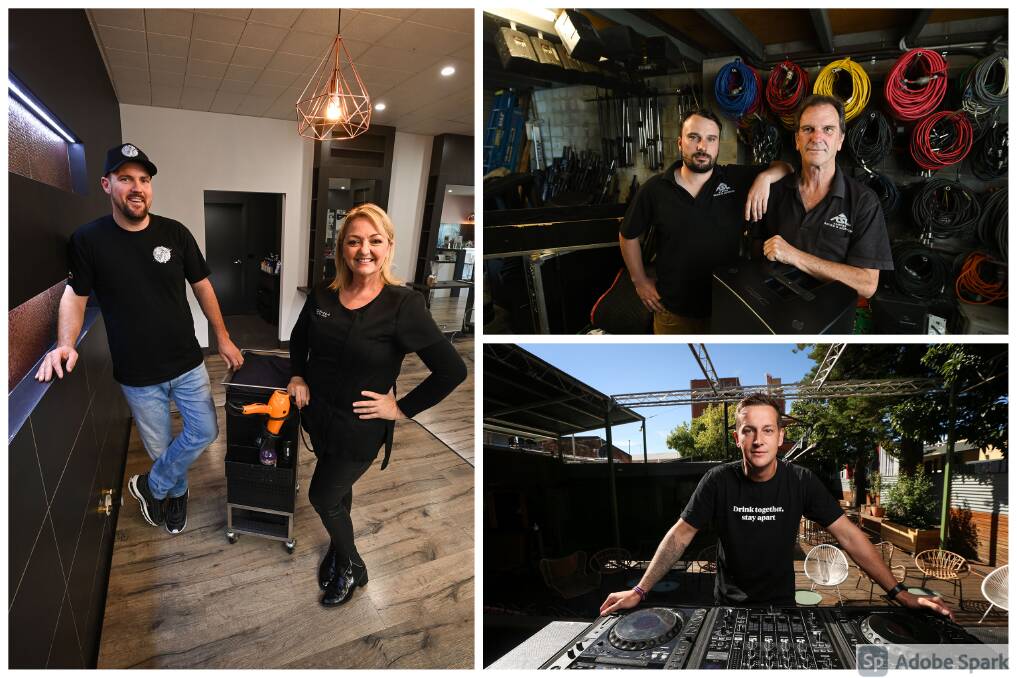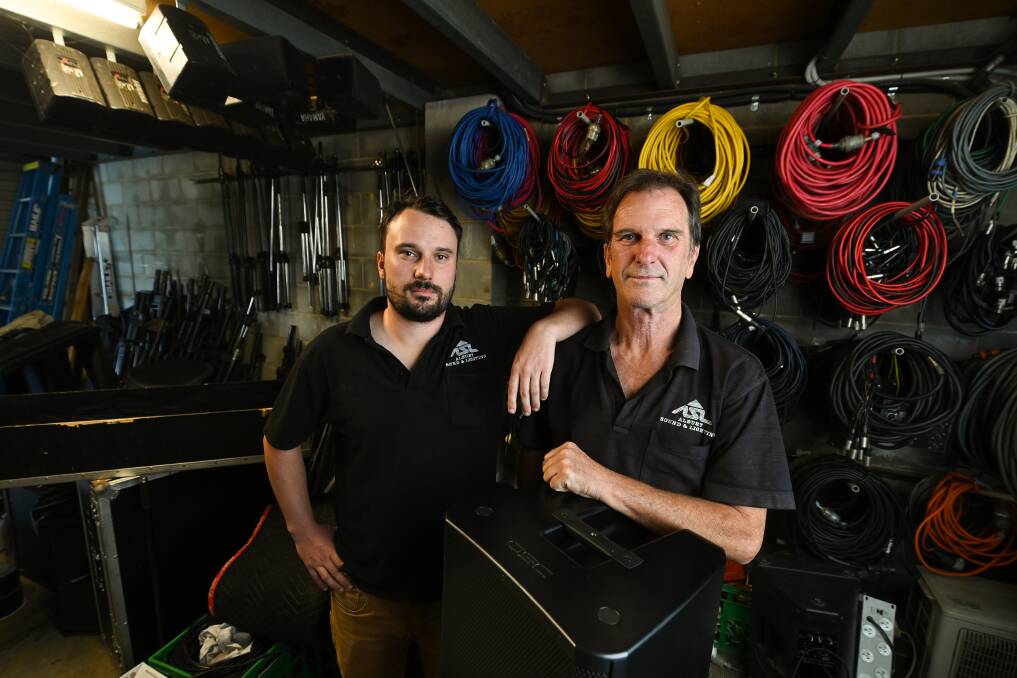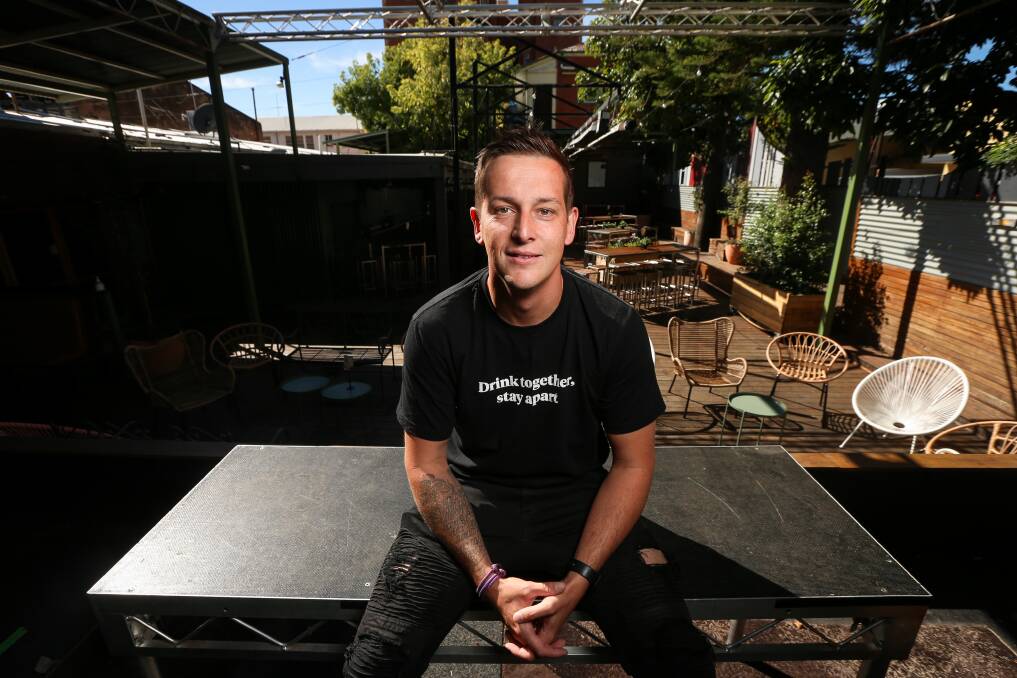
Anxieties were so high this time one year ago, Ross Schulz - running the light and sound for Opera in the Alps - was being told he shouldn't be in Beechworth.
Subscribe now for unlimited access.
$0/
(min cost $0)
or signup to continue reading
"People were worried about the virus," he said.
"Then on the Monday, I got phone call after phone call of cancellations.
"Every job for the year was cancelled, except for one tentative booking which was the Relay for Life.
"To me, it just felt like my business was being pulled out from underneath me.
"It got to the point where I couldn't take any more phone calls; my head was just not in the right spot."
The owner of Albury Sound and Lighting was entering the biggest period of uncertainty in his 35-year-career.
"For virtually two months, we twiddled our thumbs, and then we thought, there's got to be something we can do," Mr Schulz said.
"Live-streaming at funerals was basically what saved us, during last year.
"We did probably 40-odd funerals, and it just kept our minds on a job each week."
Mr Schulz is glad his family-owned business could pay off their building on Hume Street before the pandemic hit.
"I am lucky; there's a guy I know in Melbourne who has $5 million worth of gear sitting in a warehouse and he's doing freight with his trucks just to cover the rent," he said.
"There were no functions at all last year.
"Come towards the end of the year, school graduations started, Council asked us to do some lighting instead of Carols by Candlelight, and we did the trots and races.
"Knowing jobs are in the pipeline keeps your confidence up.
"But for a while there, we didn't know where we were going to go.

"The hire places have been struggling, but everyone's found little ways of doing extra things because they have to.
"I'm confident we will get back to probably 70 per cent of what we were; I don't think we'll ever get back to 100 per cent, at this stage."
Savings on transport costs and more time for family have been among the positives.
With JobKeeper coming to an end on Sunday, Mr Schulz said it would impact his business.
"It's going to be probably tough, but we can survive, we've got enough to keep us going," he said.
"JobKeeper was the best thing that ever happened; without it there would have been so many businesses that just closed the doors.
"I'm concerned about little shops up the streets that aren't going to be able to survive.
"People aren't spending what they used to spend."
Adapting proves key
On March 30, 2020, Dallas Holt was weighing up how to keep his Wodonga hairdressing business open.
The industry was one of few allowed to remain open, with hospitality, retail and most other sectors forced to shut down.
"Everyone I speak to in the industry doesn't know what to do," he told The Border Mail then.
"I have unfortunately had to let some casuals go."
Reflecting on that time, Mr Holt said it was highly stressful.
"Until JobKeeper was announced, everything was unknown," he said.
"The first shutdown was more panic, and then with the border closures, it was trying to find a way to continue."
Mr Holt had launched employment negotiations with now-manager Rachael Simmons just before the pandemic and decided to go ahead with bringing her on.
Now, the business is back on track and has actually expanded its footprint.
"We've been able to strengthen what we have and diversify, which means that we've created new things that we never had before," Ms Simmons said.
"We're now able, if something happens and a portion of our business closes, to have other portions of our business that could keep us alive.

"We turned our tea room into a barber shop, and turned our closet into a lash room - we've got beauty, tanning and teeth whitening.
"So having that diversity is going to be fantastic.
"We've noticed a lot of places that have diversified as well."
After losing four staff - some to personal reasons and others to economic pressures - Mr Holt and Ms Simmons have steadily built back up their team.
"We've gone from two initial staff at the beginning, to now 12," Ms Simmons said.
"I feel like it's now created a new pattern of growth; we are continually thinking of new ways to improve, and supporting the growth of our team."
DMH came off JobKeeper last year, ahead of the second extension of the scheme.
"Without that initially, we would have really struggled," Ms Simmons said.
"From a community perspective, there's obviously been some really sad things that have happened with some businesses, not just in our industry but in the food industries and such that have not been able to survive the shutdown.
"The entertainment and hospitality sectors are the ones we hear the most about."
Pressure is still on
The accommodation, tourism, retail and entertainment industries remain among those most impacted by the pandemic - although every business has been affected in some way.
There is growing confidence as Australia's vaccination program ramps up.
New eased rules came into effect last night in Victoria, welcomed by Benambra MP Bill Tilley.
"This is a huge fillip for businesses and shopping centres who have seen a steady stream of customers head five minutes across the river into NSW to shop without masks," he said.
"You will also be able to have 100 people at home, and 200 of you can catch up if you are in the great outdoors.
"There are no restrictions on hospital and aged care visits and in what will be huge relief for the wedding industry, the caps there are gone too."
Discrepancies between state-based restrictions and border closures have seen different levels of impact across outbreaks in 2020.
Pubs and clubs on the NSW side have been held up most recently by patrons not being able to stand up at bars or use dance-floors.
But from midnight Monday, there will be no caps on weddings and funerals and no restriction on dancing at those events or in venues, among other things.

That was music to the ears of Bart Furst, who manages Beer DeLuxe and The Albion in Albury and more recently The Criterion at Yarrawonga.
It is a far cry from where they were one year ago.
"It was really sad to shut down, but I enjoyed the few weeks at home, having young kids," Mr Furst said.
"But I was worried about the mental health of my staff and we've been helping them through that.
"We got the nod to open in June and we had 10 people inside, which wasn't viable, but it gave us something to do and the ability to practise our COVID safety stuff.
"Then we started thinking outside of the square - like 'private pub' for you and 9 people - which was cool and then we got slowly and slowly more people.
"We put those igloos in, just before the big Melbourne outbreak, and we had 3000 people through in three months which was great."
Mr Furst said JobKeeper was crucial through border closures.
"Obviously, that helps keep the business going but as we get busier we won't need it as much," he said.
"There will be some hospo venues that do need it.
"Restrictions lately have been the worst, getting dancing for two weeks in December and then it disappears.
"The two-square-metre-rule works for us - I can have 590 in here and it's usually 1100 which is a lot more than everywhere else.
"I'm not being greedy as such, but I've got a really big venue that looks like two people in the middle of the MCG when it's half-full.
"Capacities don't meet demand at the moment."
While Mr Furst would ideally like to see business-as-usual, he understands and respects the restrictions.
"I think going forward, with more confidence we'll see more people just wanting a weekend out after football, catching up with friends and so on," he said.
"Hopefully we're out of it now, and dancing stays.
"We can stop being the fun sheriffs."


